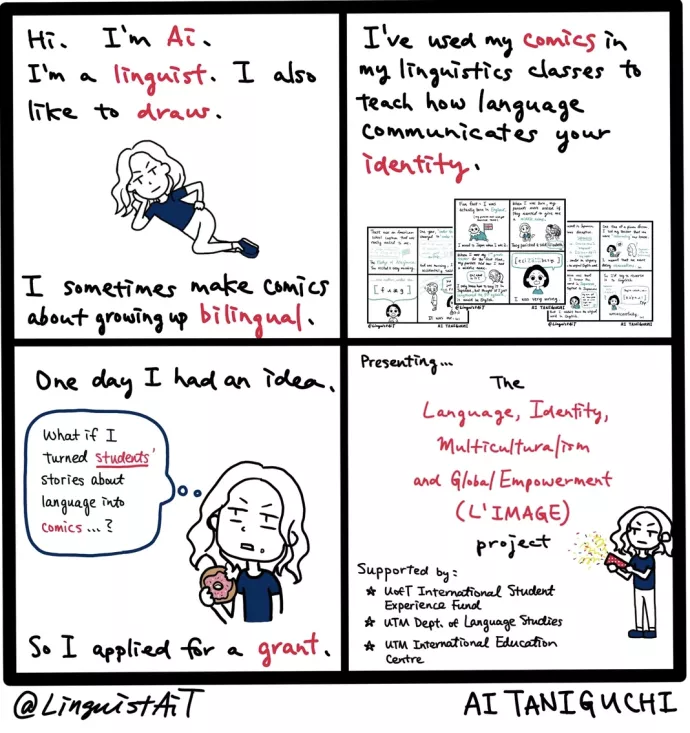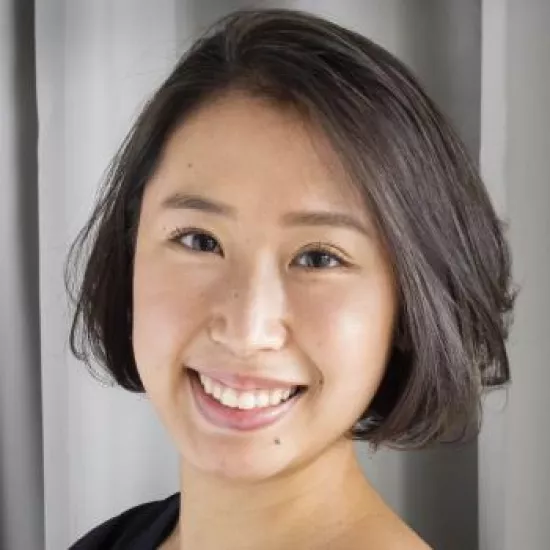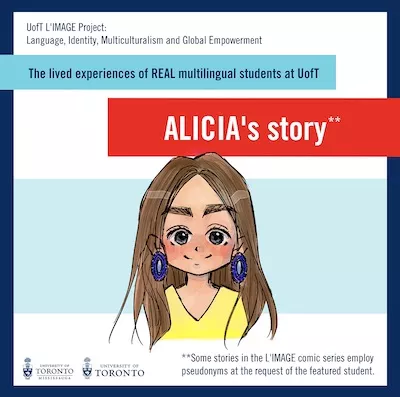
Telling tales from school
UTM prof gets to the heart of students’ multilingual journeys and reconceives them as comics

When Ai Taniguchi was planning out her project called L’IMAGE – Language, Identity, Multiculturalism and Global Empowerment – she was confident it wouldn’t be difficult to recruit participants. Being multilingual herself, fluent in Japanese and English with some French proficiency in the mix, she knows firsthand that people usually have a story to tell.
“I know I certainly had stories, so the idea came from that personal background,” says Taniguchi, an assistant professor, teaching stream, in UofT Mississauga’s Department of Language Studies.
“I feel like people want to be heard, especially when you're navigating that really complex, multilingual, multicultural identity, sometimes you feel like people don't understand your entire you.”
L’IMAGE is a graphics-based project that she spearheaded in 2021. The project provides an outlet to explore identity and ultimately, as it states on the LingComics website, “hope[s] to increase intercultural empathy among U of T community members.”
Taniguchi put out the call for undergraduate students to submit their stories related to their experiences of being multilingual in Canada, and she selected several, ensuring she has a good range – funny and sad stories, as well as provocative ones – and representing many different backgrounds. Once she interviewed the students, Taniguchi turned the stories into comics. She says it was a collaborative process: she reviewed the comics that she created with each respective student to ensure it represented them and their story accurately, and refined them as she went along. From 2022-23, Taniguchi posted all 13 stories to her website and on her social media channels, both Twitter and Instagram, though she says the latter is more conducive to this kind of visual representation.
Although she was not formally educated in any specific art form or art school, Taniguchi says that art, particularly when her family moved to the US from Japan when she was a child, has always provided her with a way to connect with others.
“I have always drawn and been fascinated by the visual arts,” says Taniguchi in a recent interview on VIEW to the U podcast.
“When my family immigrated to the United States when I was six, I didn't speak a lot of English, but people noticed that I was a good artist. Art was really a great way for me to communicate and interact with my peers when my English proficiency wasn't high enough for verbal communication. I just continued to personally pursue art as a hobby over all this time, and interesting that we're here now – that it intersects with my scholarly work.”
It is evident that Taniguchi’s aim for this project emerged from her own experiences and skills in animating personal stories, but also came from a place of wanting to take a deeper dive into her field of linguistics.
Taniguchi’s area of expertise is in semantics and pragmatics in language. She is particularly interested in how different words combine to form the meaning of sentences, and she uses mathematical models to see what kinds of meanings a word contributes to a phrase. She is also interested in the way in which different sentences can be interpreted or have implied and unsaid meanings.
“In the field of linguistics, we kind of forget there's people attached to the languages that we're studying,” says Taniguchi.
“We have to ask ourselves, as linguists, as educators, ‘why does linguistics matter for people?’ Language is a big part of your identity. Language matters, linguistics matters because language is a huge part of who you are.”
Resources

- Find out more about Professor Taniguchi’s work and hear the full
VIEW to the U interview where she talks further about her research, the L’IMAGE project, and her recent diagnosis of Attention-Deficit/Hyperactivity Disorder (ADHD). ADHD is a type of neurodivergence, which basically means a person’s brain works differently than someone with a so-called “neurotypical” brain.
Taniguchi says it is the way in which her ADHD brain works that has fed her creativity and fuelled her art and innovative pursuits, like the L’IMAGE project.
- See Professor Taniguchi’s Twitter and Instagram accounts for the full range of L’IMAGE comics, as well as posts related to neurodiversity.
- Visit the LingComics website for more of Professor Taniguchi’s work, teaching, and art.
